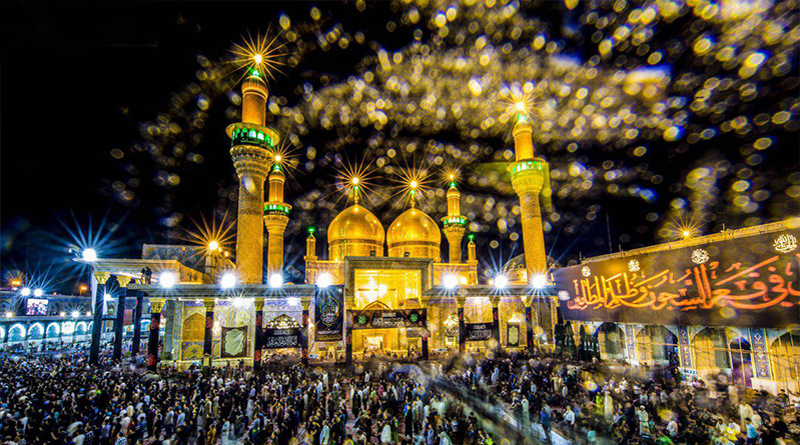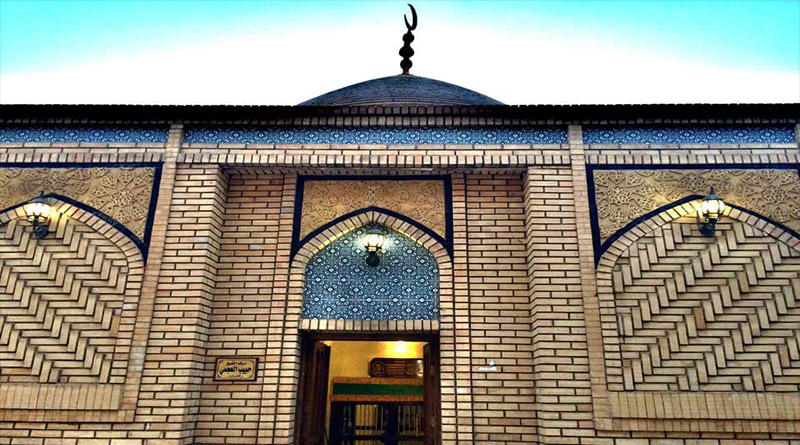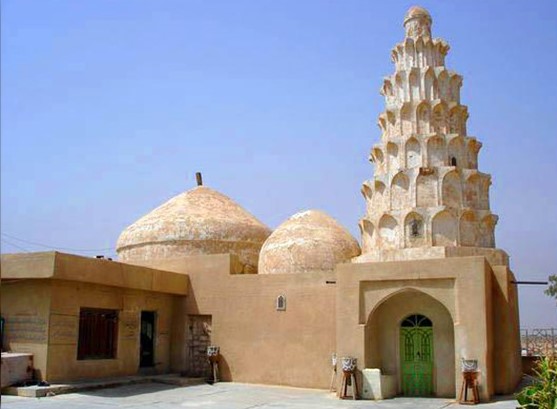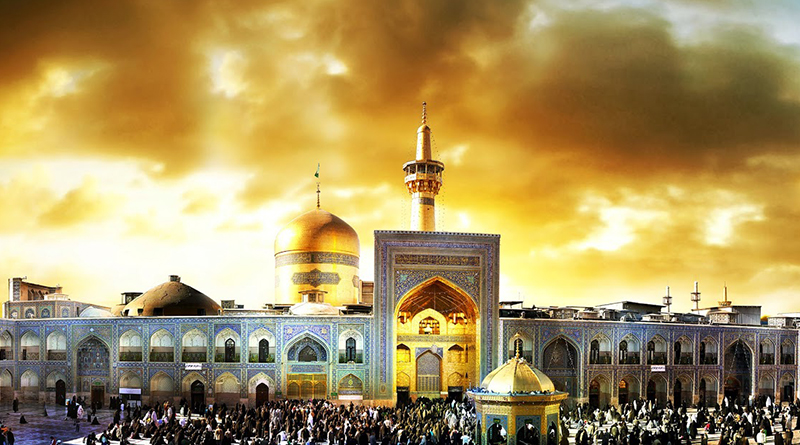He was the light of the Prophet’s ﷺ garden, the pupil of the eye of ʿAli the Saint—may Allah honor his face—the knower of the secrets of the Qur’an, the unveiler of the symbols of revelation, the exemplar of the great Imams, and the quintessence of the noble descendants of the Prophet ﷺ.
His Birth
Imam Musa al-Kadhim (peace be upon him) was born in the year 128 AH in Al-Abwa’, a village between Mecca and Medina, where Āminah bint Wahb, the mother of the Prophet ﷺ, is also buried.
His Age and Imamate
He lived with his father for twenty years (some sources say nineteen). After the passing of his father, Imam al-Sadiq (peace be upon him), he assumed the Imamate at the age of twenty and led for thirty-five years.
His Titles
He was known by many noble titles, including:
- al-Kāẓim – The Forbearing
- Bāb al-Ḥawāʾij – The Door to Needs
- al-Tiryāq al-Mujarrab – The Proven Remedy
His Lineage and Family
His father was the truthful Imam Jaʿfar ibn Muḥammad ibn ʿAlī ibn al-Ḥusayn ibn ʿAlī ibn Abī Ṭālib (may Allah honor his face). His mother, Ḥamīdah al-Muṣaffāh, was the daughter of Ṣāʿid al-Barbarī. She was an Andalusian woman and was affectionately nicknamed Luluʾa (The Pearl).
According to al-Biḥār, Imam al-Ṣādiq (peace be upon him) said:
“Ḥamīdah was purified from all impurities, like pure gold. The angels continued to guard her until she was delivered to me. She is a gift from God to me and to the proof who will succeed me.”
She once dreamt that the moon fell into her lap. Imam al-Ṣādiq interpreted it, saying:
“You will bear a child who will have no veil between him and Allah.”
His Attributes
Ibn al-Ṣabbāgh described him:
“He was the pious Imam who spent his nights in prayer and his days in fasting. Because of his immense patience and forgiveness toward those who wronged him, he was known as al-Kāẓim.”
He was so generous that whenever he heard of someone harming him, he would send them money.
His Kunyah
He was known by several teknonyms:
- Abū ʿAlī
- Abū Ibrāhīm
- Abū al-Ḥasan
His Appearance and Character
He was of dark complexion, the most devout, the most knowledgeable, the most generous, and the noblest of his era. He would personally distribute money to the poor of Medina during the night so that they would not know who gave it. After his death, this charitable support ceased—just as it had after the passing of his noble ancestors, particularly Imam ʿAlī Zayn al-ʿĀbidīn (peace be upon him).
He was known for unmatched forbearance. One day he said to his companions:
“If someone comes and whispers something unpleasant in your right ear, then turns to your left ear and apologizes—accept his apology.”
His Life
He lived in Medina until the Abbasid Caliph al-Mahdi summoned him to Baghdad and imprisoned him. Al-Mahdi later saw Imam ʿAlī ibn Abī Ṭālib (peace be upon him) in a dream reciting the verse:
“So would you perhaps, if you turned away, cause corruption on earth and sever your ties of kinship?” (Qur’an 47:22)
Frightened by this dream, al-Mahdi released the Imam.
Later, Caliph Hārūn al-Rashīd also imprisoned him. He saw a dream in which an Abyssinian slave holding a spear threatened him:
“If you don’t release Mūsā ibn Jaʿfar now, I will slaughter you with this.”
Terrified, Hārūn ordered his chief guard to release the Imam immediately and let him choose whether to stay or return home. The guard, astonished, conveyed the message to the Imam.
The Imam replied:
“Do not be surprised. The Messenger of Allah ﷺ came to me and said: ‘O Musa, you have been imprisoned unjustly. Say these words, and you shall not spend the night in prison.’”
Then he recited:
“O Hearer of every sound, O Provider of sustenance, O Giver of flesh to bones and Restorer after death, I ask You by Your Most Beautiful Names, and by Your Greatest, Most Hidden Name, which no one among creation knows, O Forbearing One whose forbearance no one can withstand, O Source of endless blessings beyond counting—relieve me!”
And it happened as he was promised.
His Miracles
Shaqīq al-Balkhī narrated:
“In the year 149 AH, I saw a man during the Hajj pilgrimage—alone, without provisions or mount. I thought: ‘He is burdening others and throwing himself into destruction.’
He turned to me and said: ‘O Shaqīq, avoid much suspicion. Verily, some suspicion is sin.’ Then he disappeared.
At the next station, I found him again, weeping in prayer. As I approached to apologize for my earlier thought, he recited: ‘I am indeed Forgiving to those who repent, believe, and do good deeds.’ (Qur’an 20:82)
Later, I saw him beside a well. His bucket had fallen in. He supplicated, and the water rose, carrying the bucket to him. He made ablution, prayed, then placed some dust in the bucket and drank from it.
I asked to share it. He handed me the bucket and said: ‘O Shaqīq, think well of us.’
I drank—and by Allah, I had never tasted anything more refreshing and delicious.”
The Caliphs During His Lifetime
- al-Manṣūr
- al-Mahdī
- Mūsā al-Hādī
- Hārūn al-Rashīd
His Companions
According to al-Tūsī in Ikhtiyār al-Rijāl, six companions were unanimously recognized for their reliability:
- Yūnus ibn ʿAbd al-Raḥmān
- Ṣafwān ibn Yaḥyā
- Muḥammad ibn Abī ʿUmayr
- ʿAbd Allāh ibn al-Mughīrah
- al-Ḥasan ibn Maḥbūb
- Aḥmad ibn Muḥammad ibn Abī Naṣr
Other notable and trusted companions include:
- al-Ḥasan ibn ʿAlī ibn Faḍḍāl
- ʿUthmān ibn ʿĪsā
- Dāwūd ibn Kathīr al-Raqqī
- ʿAlī ibn Jaʿfar al-Ṣādiq
- ʿAlī ibn Yaqṭīn
- Abū al-Ṣalt al-Harawī
- Ismāʿīl ibn Mihrān
- ʿAlī ibn Mahzīyār
- al-Rayyan ibn al-Ṣalt
- Aḥmad ibn Muḥammad al-Ḥalabī
- Mūsā ibn Bukayr
- Ibrāhīm ibn Abī al-Bilād
His Passing
He passed into the realm of divine presence in 183 AH. It is said that he was poisoned.
Sources
- Ibn Khallikān, Wafayāt al-Aʿyān, vol. 4, p. 393
- Murtadā ibn Muḥammad Āl Naẓmī al-Baghdādī, Tadhkirat al-Awliyāʾ, p. 118
- Sīrah Ahl al-Bayt, p. 82
- Sīrat al-Aʾimmah al-Ithnā ʿAshar, vol. 2, p. 334




